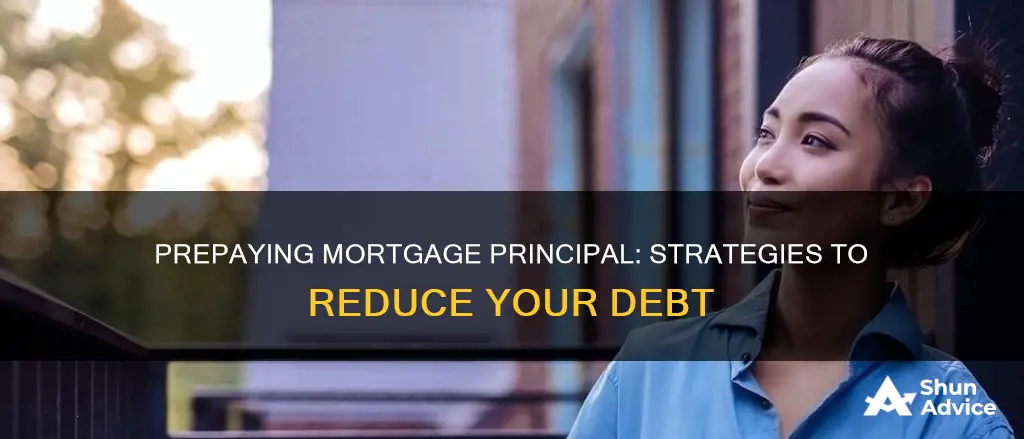
Prepaying your mortgage can be an attractive option for many homeowners who want to pay off their mortgage faster than planned. It involves making additional payments towards the principal loan balance, which is the amount you owe in order to pay back the money borrowed from the lender. These extra payments can be made through biweekly payments, periodic extra payments, or a lump sum. By prepaying your mortgage, you can reduce the interest paid over the life of the loan, shorten the loan term, and build home equity faster. However, it's important to consider the downsides, such as reduced liquidity for other needs and potential prepayment penalties charged by lenders.
Prepaying Mortgage Principal Characteristics and Values Table
| Characteristics | Values |
|---|---|
| Definition | Prepaying a mortgage refers to making additional payments towards your principal loan balance apart from the regular monthly mortgage payments. |
| Benefits | Paying off your mortgage early provides financial freedom and peace of mind. |
| Prepaying a mortgage can help you save on interest payments over the life of the loan. | |
| Prepaying can help you reduce the loan term. | |
| Prepaying can help you build home equity faster. | |
| Prepaying can gradually reduce your debt-to-income (DTI) ratio and make it easier to qualify for other financing in the future. | |
| Prepaying can eliminate private mortgage insurance (PMI) sooner. | |
| Downsides | Prepaying on a monthly basis can put you at risk of not being able to cover a surprise expense. |
| Prepayment may not be the best use of your money. | |
| Prepayment Penalty | A mortgage prepayment penalty is a fee some lenders charge when you pay all or part of your mortgage loan off early. |
| Most borrowers are not subject to a prepayment penalty. | |
| Before making extra payments, review your closing disclosure to verify that there are no prepayment penalties tied to your loan. | |
| Payment Options | Biweekly payments |
| Periodic extra payments | |
| Lump sum |
What You'll Learn

Prepaying mortgage principal saves money on interest
Prepaying your mortgage principal can save you money on interest and help you pay off your loan faster. When you make an extra payment on your loan, you directly reduce your principal, thus increasing your equity. This triggers a cascade effect that speeds up the repayment of your loan. Since your monthly interest payments are calculated based on the outstanding balance on your loan, a lower principal balance will lead to lower interest payments.
There are several ways to prepay your mortgage principal. You can make one extra monthly payment once a year, or you can make biweekly mortgage payments, which will result in 13 monthly payments in a year. You can also choose to make a lump-sum payment or periodic extra payments. If you have a large sum of money available, you can consider recasting your loan. This involves paying a fee to the lender, who will then reamortize your loan with a new payment schedule.
Before making additional mortgage payments, it is important to review your financial situation and goals. While prepaying your mortgage principal can save you money on interest, you may be able to generate a better return by investing your money elsewhere. Additionally, some lenders may charge a prepayment penalty, so it is important to review your closing disclosure to avoid unexpected fees.
Overall, prepaying your mortgage principal can be a great way to save money on interest and pay off your loan faster, but it is important to consider all the factors involved and ensure that it aligns with your financial goals.
Selling Your Mortgage Home: Navigating the FSBO Route
You may want to see also

Prepaying mortgage principal increases home equity
Prepaying your mortgage principal can be a great way to increase your home equity and save money on interest. Here's how it works:
When you take out a mortgage, you agree to pay it back over a long period, often decades. This means that most of the money you pay in the initial years goes towards interest, with only a small portion reducing the principal balance. By prepaying your mortgage principal, you can speed up the process of building equity and own your home sooner.
Home equity is the amount of your home that you actually own. It is the difference between what your home is worth and what you owe to your lender. As you make payments on your mortgage, you reduce the principal balance and build equity. Prepaying your mortgage principal directly reduces your loan balance, increasing your equity by the same amount. This also triggers a cascade effect, reducing future interest payments and speeding up loan repayment.
There are several ways to prepay your mortgage principal. You can make extra payments towards the principal annually or bi-weekly, or pay a lump sum. If you have a large sum available, you can consider recasting your loan, which involves paying a fee to the lender to reamortize your loan with a new payment schedule. This allows you to keep the same number of payments and years to repay, but with a smaller sum.
Before making additional mortgage payments, it is important to consider if your money could be better utilized elsewhere, such as retirement savings or other investments. Additionally, review your loan agreement to ensure there are no prepayment penalties. By understanding your financial goals and loan terms, you can make informed decisions about prepaying your mortgage principal to increase your home equity.
Real Estate Strategies: Adjusting for Mortgage Rates
You may want to see also

Prepaying mortgage principal reduces loan term
Prepaying your mortgage principal can be a great way to reduce your loan term and save money on interest. When you prepay your mortgage, you pay extra towards the loan principal, helping to pay off your loan sooner. This strategy can be achieved through biweekly payments, periodic extra payments, or a lump sum.
Let's consider an example to illustrate the benefits. Suppose you take out a $400,000 mortgage with a 6.8% interest rate, resulting in monthly payments of $2,608. By making an additional one-time payment of $50,000 in month 61, you directly reduce the loan balance by the same amount. As a result, all future interest payments will be lower since they are calculated based on the outstanding loan balance. In this scenario, you would pay off your loan 51 months early and save a significant amount in total interest payments.
It's important to note that not all lenders allow early payments without penalties, so be sure to review your closing disclosure for any prepayment penalties associated with your loan. Additionally, consider whether your money could be better utilized elsewhere, such as retirement savings or paying off other debts with higher interest rates.
Before making extra payments, ensure that your servicer applies the funds towards the loan principal. By doing so, you can achieve your goal of paying off your loan early and maximizing your interest savings. This strategy can be particularly effective if you have a windfall, such as an unexpected bonus or inheritance, that you can put towards the principal.
In summary, prepaying your mortgage principal can be a powerful tool to reduce your loan term and save on interest costs. However, it's important to carefully consider your financial situation, goals, and potential penalties before making extra payments towards your mortgage principal.
Mortgage Payment Confirmation: What You Need to Know
You may want to see also

Prepayment penalties
There are two types of prepayment penalties: soft and hard. A soft prepayment penalty applies in fewer situations than a hard prepayment penalty. If your loan has a soft prepayment penalty, it will only apply if you decide to refinance your loan or pay off a large chunk of your mortgage within a calendar year. A hard prepayment penalty can be triggered by several different situations. If your mortgage has a hard prepayment penalty, paying off your mortgage early might not be the best financial decision.
It is important to note that prepayment penalties are becoming increasingly rare and are limited by law. They mainly apply to the early years of a mortgage and are associated with non-conforming or non-qualified mortgages, which are geared towards applicants who do not fit traditional borrower profiles and feature higher fees.
Mortgage Approval: What You Need to Know
You may want to see also

Prepaying mortgage principal for financial stability
Prepaying your mortgage principal can be a great way to achieve financial stability, but it's important to carefully consider your options before making any decisions. Here are some key things to keep in mind:
First, understand the concept of prepaying your mortgage principal. When you take out a mortgage, you typically agree to pay it back over a long period, often decades. Prepaying your mortgage means paying extra towards the loan principal, which helps you pay off the loan sooner and save money on interest. This can be done through various methods, such as biweekly payments, periodic extra payments, or a lump sum.
Next, evaluate the benefits of prepaying your mortgage principal. By making additional payments, you can reduce the overall interest paid over the life of the loan. This is because the interest payments are calculated based on the outstanding loan balance. So, by reducing the principal early, you will end up paying less interest overall. Prepaying your mortgage principal can also help you build home equity faster, providing you with financial freedom and peace of mind.
However, it's important to consider the potential downsides as well. Prepaying your mortgage may affect your liquidity, especially if you have a variable monthly income. It's crucial to ensure that you have enough funds to cover unexpected expenses and that your essential financial obligations are met. Additionally, you should evaluate if prepaying your mortgage is the best use of your money. Consider if you are contributing enough to your retirement savings or if there are other debts with higher interest rates that you should prioritize.
Finally, before making any decisions, review the terms of your mortgage agreement and consult with your lender. Some lenders may charge prepayment penalties, which are fees for paying off your mortgage early. Understand the process for making extra payments and ensure that any additional funds are applied correctly towards principal reduction.
In conclusion, prepaying your mortgage principal can lead to financial stability by reducing interest payments, building equity faster, and providing peace of mind. However, it's important to carefully assess your financial situation, consider the pros and cons, and make an informed decision that aligns with your financial goals.
Unlocking Your Experian Mortgage Score: A Guide
You may want to see also
Frequently asked questions
Prepaying your mortgage principal can reduce the balance on your loan, build home equity faster, and speed up your repayment of the overall loan. You will also save money on interest payments over the life of the loan.
You can prepay your mortgage principal by making one extra monthly payment once a year, or by making biweekly mortgage payments. You can also make a one-time lump-sum payment.
Some lenders charge a prepayment penalty when you pay off your mortgage early. This is usually a fee based on a percentage of the loan principal. However, most borrowers are not subject to a prepayment penalty, so be sure to check the terms of your mortgage agreement.
The amount of money you can save depends on several factors, including the interest rate on your loan, the outstanding balance, and the number of years left on your loan term. You can use an additional payment calculator to estimate how much you can save by making extra payments.







